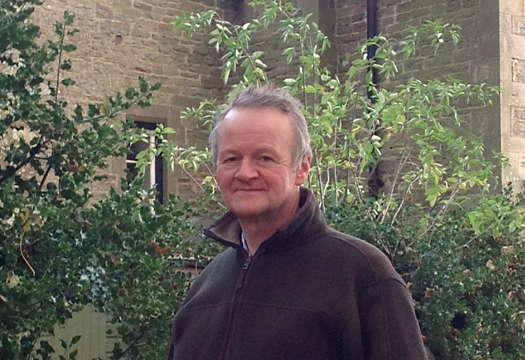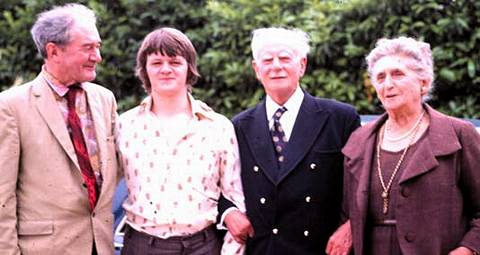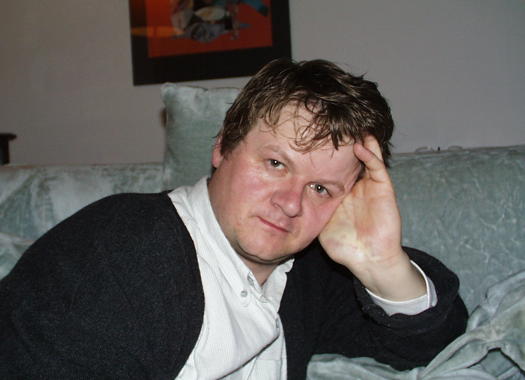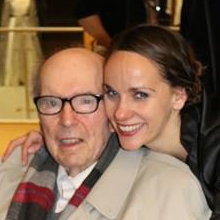- Bryn Terfel
- Keda Records
- Christopher Brown
- subtitles
- Theodore Antoniou
- Summer Music in City Churches
- Muriel Oberhofer
- Lisa Schatzman
Adrian Williams
The English Symphony Orchestra
announces Adrian Williams as its
John McCabe Composer-in-Association for 2019/20
The English Symphony Orchestra (ESO) has announced that Adrian Williams (born 1956) will be its John McCabe Composer-in-Association for the 2019/20 season. During this period, Williams' music will be showcased by the ESO. In addition to performances, recordings will also be made.
Ken Woods, the ESO's Artistic Director, says:
I only discovered Adrian's music very recently in 2017, but as soon as I encountered it, I realised I was listening to the work of one of the greatest composers of his generation. Adrian is just the kind of composer we had in mind when we established the 'John McCabe Composer-in-Association' chair, a creative artist of the highest calibre who will become an active part of the ESO family, and who we will try our utmost to support through performances and recordings. We couldn't be more excited to get to work with him this year.

Adrian Williams at home in the Welsh Borders, close to Hergest Ridge.
Photo © 2018 Keith Bramich
ESO founder William Boughton first established the tradition of working closely with composers including Michael Tippett and Nicholas Maw. When Ken Woods was appointed ESO Principal Conductor in 2013, one of his first actions was to invite John McCabe to be ESO Composer-in-Association. Sadly, the partnership only lasted from 2013 until McCabe's untimely death from a brain tumour in 2015. Woods commented:
It will forever be a source of deep regret that John's appointment as composer-in-association with the orchestra coincided almost exactly with the onset of his illness. There were so many more projects we wanted to do, and I know John bitterly regretted the times he was unable to travel to join us. John was so excited about the prospects for the partnership and was infinitely generous with his wisdom and energy, helping us to put his music in the right contexts. The video interviews we recorded as part of the association are fascinating - John could speak with awe-inspiring fluency on any musical topic. He was someone who could inspire and instruct the most expert professional musicians and engage with a general audience with wit and warmth.
Following McCabe's death, the ESO permanently renamed its Composer-in-Association Chair in memory of McCabe. Philip Sawyers became the first McCabe Composer-in-Association (2015-18), followed by David Matthews, for the 2018-19 season.
Plans for Adrian Williams' first year as Composer-in-Association include an ESO concert at Malvern Priory on 29 April 2020 featuring Williams' string orchestra work Migrations. There will also be a performance of Russells' Elegy, which pays homage to conductor, pianist and broadcaster John Russell (1916-1990), who was a close friend of Gerald Finzi, and to film director Ken Russell (1927-2011).

From left to right: John Russell, Adrian Williams, Bernard Shore and Olive Shore in 1977
Williams' acclaimed string orchestra transcription of Richard Wagner's Prelude to Tristan und Isolde, commissioned by the Amsterdam Sinfonietta, can also be heard during the 2019/20 ESO season.
On Sunday 5 April 2020 at the Shirehall, Hereford, HR1 2HZ, UK, two orchestras - the ESO and Herefordshire Youth Orchestra - will join forces to play Adrian Williams' Three Gifts. Written for the National Children's Orchestra, for a concert in aid of what used to be called the Spastics Society, Three Gifts is a touching series of character portraits of three of Williams' late friends who each lived with some kind of disability. Each is represented by a movement which features a solo instrument and orchestra. Michael Smith, a chemistry teacher from Presteigne in Powys, Wales, is represented by the cello, and a movement based on Herbert Howells' hymn tune Michael. Angela Tomblings, daughter of Philip Tomblings, a former director of music at All Saints Croxley Green, Hertfordshire, is honoured by a movement featuring the clarinet, and the final Rondo for Richard Dodderidge, son of Morris Dodderidge, again from Presteigne, features the trumpet, and is based on the first movement of J S Bach's Brandenburg Concerto No 3 - which Richard referred to as 'the laughing Bach'.
Born in Hertfordshire in 1956, Adrian Williams showed precocious talent from the age of four, spontaneously improvising at the piano. He began piano lessons at five, started composing at ten and took composition consultation sessions with Lennox Berkeley from the age of thirteen. In 1972 a large-scale choral work by Williams was performed at the Royal Academy of Music in London, and he went on to win a double scholarship to the Royal College of Music, where director David Willcocks conducted Williams' Symphonic Studies.
Whilst Composer in Residence at Charterhouse School, Williams' music developed a tougher harmonic style and became more adventurous, though retaining its central melodic vein. Williams then moved to the Welsh Border Marches, his long-term spiritual home, and became the founding light of the area's Presteigne Festival. He was artistic director until 1992, commissioning, for his final festival, works by young composers from all the member states of the European Union. Williams was also responsible for first introducing the late Basil Ramsey to Keith Bramich in 1998, resulting in what has now become Classical Music Daily.

Adrian Williams. Photo © 1998 Keith Bramich
More recently, in an extremely varied and interesting career, Williams has collaborated extensively with musicians in Poland and The Netherlands, has written much music for TV and films, and is currently writing his first symphony. The Dutch connection has produced the large-scale cantata The Idea of Peace to a libretto by Arjen Eigjenraam, for chorus, children's chorus, soloists and chamber orchestra, performed in St Paul's Cathedral, London, at the 2013 City of London Festival, and then at Vredenburg, Utrecht. More recently in 2018, the Polish connection produced a celebration in Poznań of Williams' music, including all his music for bassoon, and featuring the first performance of Spectrum, a concerto for bassoon and string orchestra with percussion and harp.
Further information: www.adrianwilliamsmusic.com
Posted 1 August 2019 by Keith Bramich





